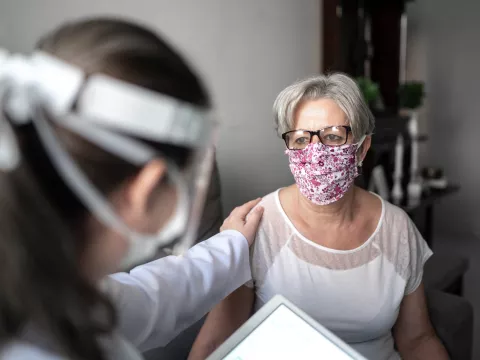- AdventHealth

Choose the health content that’s right for you, and get it delivered right in your inbox.
Maintaining your whole health as a woman requires certain screenings to ensure your body is keeping up with your mind and spirit. There are four specific screenings you should never skip or put off and AdventHealth for Women’s Health Navigator Doreen Forsythe, BSN, RN explains what they are and why they're so important.
The Well-Woman Examination
"The well-woman examination is a yearly checkup performed by either your primary care physician or by your OB/GYN,” says Doreen. “This annual screening is a great time to catch up with your care provider to review your medical and family history and share with them any changes you may have had with your body over the last year."
During the Well Woman examination, your provider may perform a clinical breast exam, where they will check your breasts for physical and visual changes and may recommend further testing based on their findings and a pelvic examination. Additional testing may be suggested based on your medical history and new reported concerns or symptoms.
It is recommended that women starting at the age of 21 should receive pap smears every three years and possibly more frequent depending on results and physician recommendations. If you've had a hysterectomy, women are still recommended to have a pelvic exam performed every three to 5 years, even if you’ve never had an abnormal result.
Mammogram
A mammogram is a screening used to look for signs of breast cancer, like tumors. Mammogram technology has come a long way in recent years and is now available in 3D. 3D mammograms and other imaging techniques like ultrasound and MRI are generally only required if your care provider needs to further investigate a tumor, cysts, or dense breast tissue.
“After you turn 40 you should start getting a screening mammogram once a year,” says Doreen. “But it’s also important to do self-exams regularly at any age after puberty.”
You should perform your self-exams monthly, one week after the first day of your period. If you notice any changes be sure to speak with your care provider. They may want to order further testing. Getting a mammogram takes about 30 minutes from registration to completion. It’s super quick and easy to do.
Colorectal Screening
Colorectal screening is used to determine the presence of any cancerous or precancerous cells in your lower digestive tract. It generally involves a colonoscopy of one type or another and the use of sedatives to make you comfortable during the process. Colorectal screening should begin at age 45 and then take place again every ten years unless there’s been a change in your digestive health such as bleeding, pain, or changes in your bowel habits.
"The screening usually takes less than an hour and is not anywhere near as uncomfortable as you might think,” says Doreen. “Your doctor will provide some level of anesthesia, whether conscious sedation, or Monitored Anesthesia Care which has a rapid onset and a quick recovery time. Depending on the type of screening you and your physician go with it will require you to prep for it. Discuss with your provider the method that works best for you and your medical history.”
Blood Pressure — Know Your Numbers
“Knowing your numbers is a powerful tool for maintaining good heart health because it allows you to know what changes you need to make or what to keep doing right,” explains Doreen.
It’s recommended that you should start checking your blood pressure regularly, starting at age 18 (or younger if recommended by your provider). Tracking your lipid panel is also important, this includes, your total cholesterol, HDL, LDL and Lipids. These numbers and the breakdown of HDL (good) and LDL (bad) cholesterols in your blood are also very important for maintaining good heart health. These should be screened every 4 to 6 years, starting at age 20. You may be recommended for more frequent testing depending on your family history and risk for heart disease.
If your cholesterol results are out of normal range, you may be recommended by your care provider to start a medication and/or consult with a nutritionist. If you have a family history of heart disease, then it’s recommended you closely monitor your numbers and speak with your care provider about any concerns you may have. The recommended benchmark for healthy blood pressure is your systolic (top number) being less than 120 and your diastolic (bottom number) being less than 80.
“If your blood pressure is elevated, you should seek medical care and contact your provider. If you don’t have an established provider, it’s now the time to find one. We have services at AdventHealth that can assist you with getting established with a primary care physician or specialist” says Doreen. “I always recommend to establish and form a relationship with a care provider while you are healthy, if possible. This way you can review your family history, discuss your risk factors and monitor your continued health.”
Find a Trusted Physician to Be Your Partner in Health
“Many things that are discussed with your provider feel personal and private. It may be embarrassing and difficult to discuss, which is why it’s so important to have an established physician that you trust and feel comfortable with,” says Doreen. “Providers will be able to treat and care for you better when they know your concerns. The more information they have, the better they can help you. I recommend that you make a list of any questions or concerns you may have before your visit. This way you don’t forget to ask or talk about them when you’re there. But most importantly, listen to your body, know your body, and pay attention to any changes in it.”
To find a care provider or to schedule any of your screening appointments, visit our women's site.




